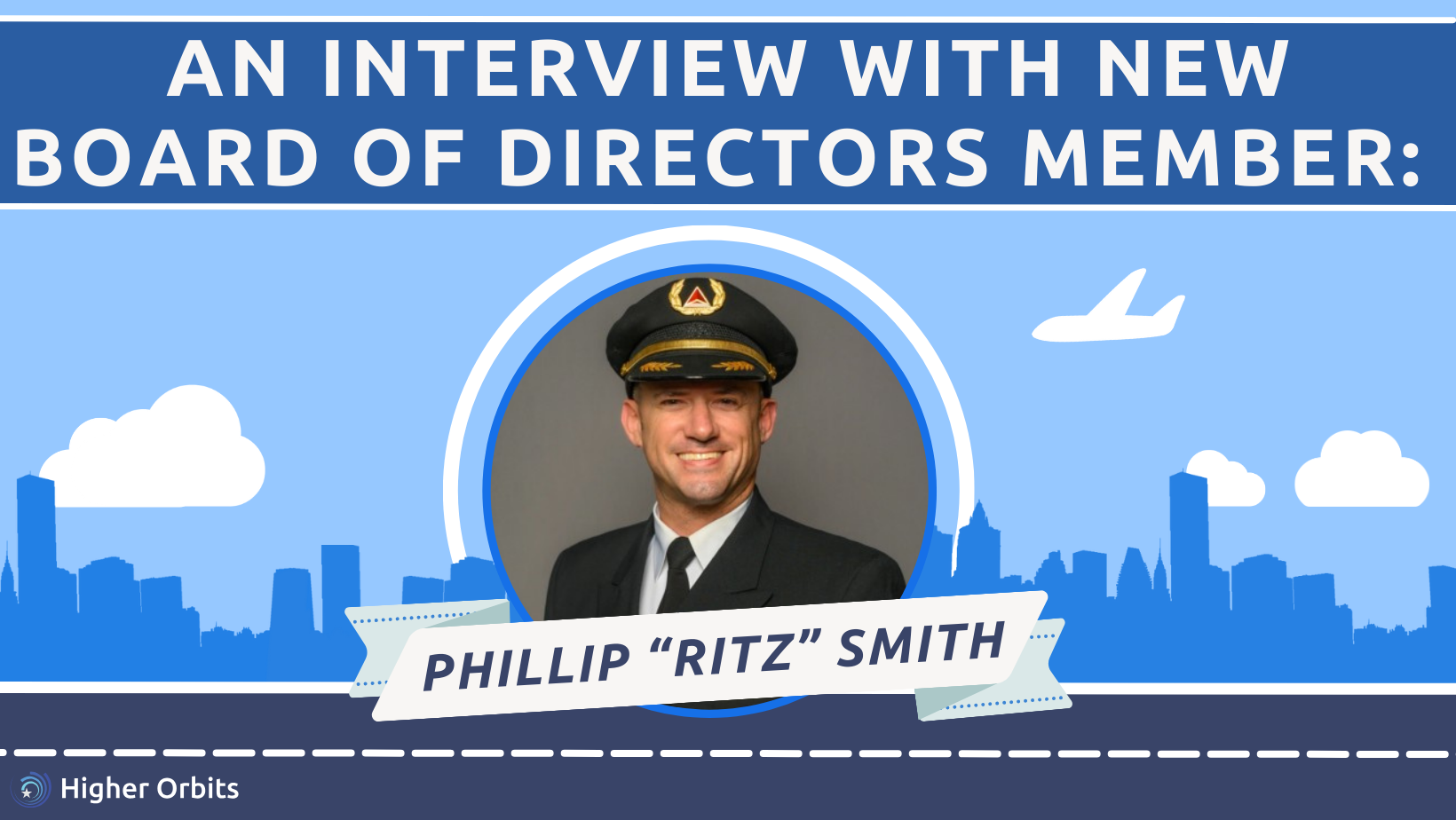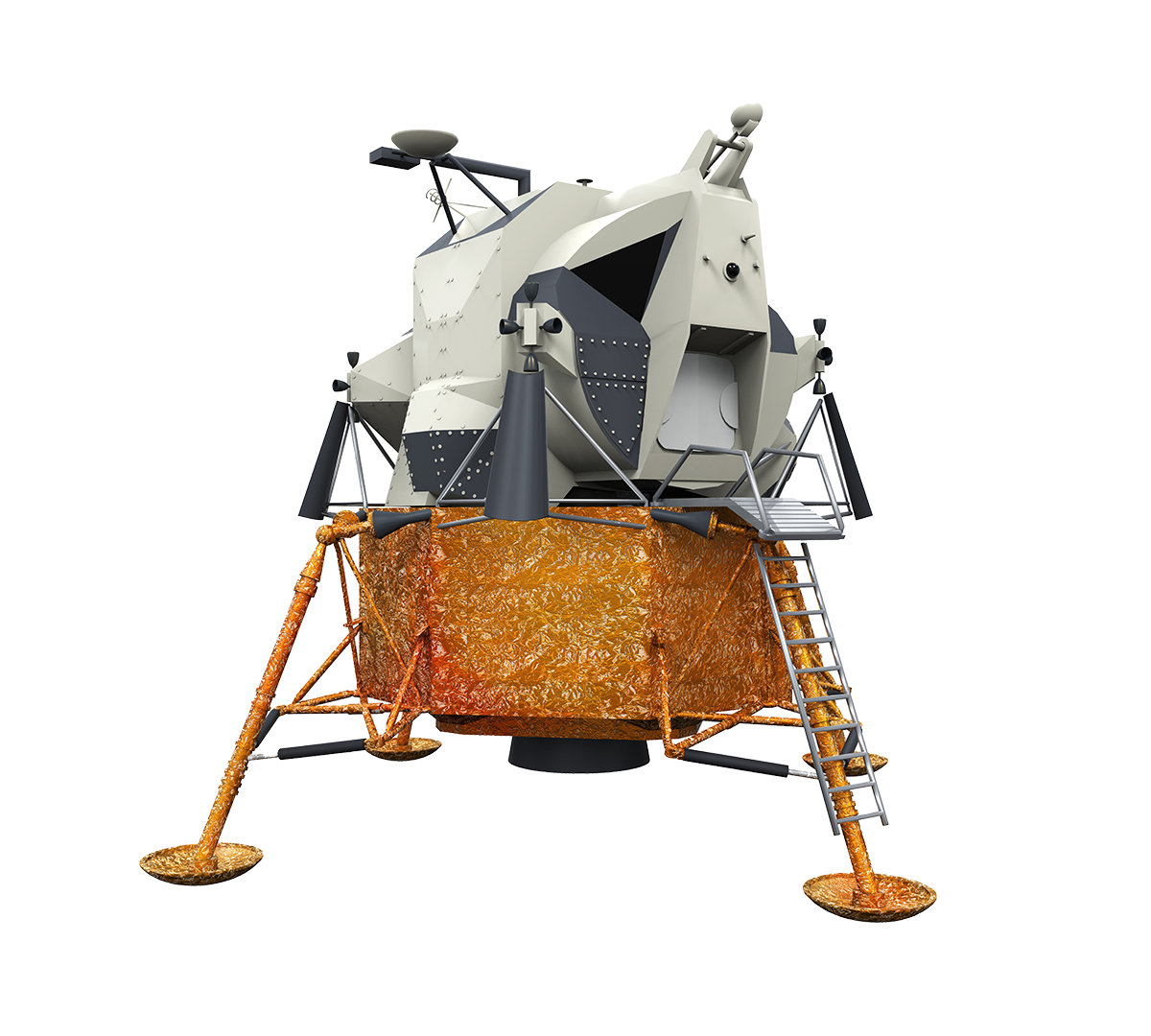The Higher Orbits Board of Directors is an incredibly diverse group of leaders from all across the STEM industries. A Board of Directors will typically meet to make important decisions regarding the future direction of projects, events, and the overall mission of the organization. The large responsibility of the position requires Board members who have a breadth of qualifying experience, responsible insight, and a keen interest in the mission of the organization. At the beginning of the year, Captain Phillip Smith, Chief Pilot of Delta Air Lines at Los Angeles International Airport, joined our Board of Directors! We are thrilled to have someone on the Board who is so experienced not only in his field as a pilot but also in groups that highlight the importance of diverse minds working together. Smith earned his Bachelor’s in Science in Legal Studies from the United States Air Force Academy in 2001 and later earned his Master’s degree in Aeronautical Science on Aerospace Operations from Embry-Riddle Aeronautical University in 2007. He held positions with Jet Suite, Atlas Air, and the United States Air Force before taking a position with Delta Air Lines where he has worked for over eight years. In an interview, Captain Phillip Smith gave his perspective on his plans with the organization, his personal STEM journey, and his advice for students interested in STEM.
What initially inspired you to join the Higher Orbits Board of Directors?
“There are a couple of things that particularly inspired me: the people and the mission.” Smith spoke of his great appreciation for the CEO & Founder, Michelle Lucas’, passion for the organization saying, “It doesn’t matter what demographic or socio-geographic area that you come from, she is bringing the excitement of exploration, space, and astronauts. It’s a wonderful thing that I am so happy to be a part of.”
How did you come to know Michelle and get introduced to Higher Orbits as an organization?
Phillip Smith attended Space Camp in his early years and was inducted into the Space and Rocket Center of the Space Camp Hall of Fame in 2008.
He said, “When she asked me to be a part of this, it was a no-brainer.”
He met Michelle after being inducted and was moved by the mission of her organization and personal passion for STEM. After speaking with her and being introduced to the mission of Higher Orbits, Smith was inspired to get involved.
You have been with Higher Orbits since the beginning of 2023. What are some of the things that stand out to you in your experience with Higher Orbits?
“The caliber of people that have been brought together,” Smith highlighted, “not just on the Board but also that she is able to take to the Go For Launch! events, such as the astronauts is incredible.”
He continued, “I’m a huge fan of the mantra, ‘If I can see it, I can be it.’ Having diverse minority groups, whether it be women or people of color or the LGBTQ+ community, out and showing folks that mantra in themselves is so incredible. That's what I love about the diverse group that she’s brought together for the Go For Launch! events. To me, it’s a huge plus and it’s really stood out to me since joining the Board.”
What has been your highlight of joining the Board of Directors?
Smith recalled getting involved with the journey of the five Higher Orbits students attending the International Science School in Sydney, Australia. When the group encountered travel difficulties making a layover in Los Angeles, he was able to personally check in with the group and make sure that everything was on the right track because he works at Los Angeles International Airport. Once he met the group of students, he was excited to meet with the “educated, smart, talented individuals.”
Smith remembered pleasant conversations with the students and said, “Getting to meet these students and see their motivation, passion, and drive was a huge motivating experience for me. It really was a reminder that there are some amazing students out there and the future is in good hands”
What are you hoping to accomplish as a member of the Higher Orbits Board of Directors?
On his plans, Smith commented, “As a member of the Board of Directors, I would love to help continue to excel the mission of Higher Orbits, to encourage more events and fundraisers, and to help in any way that I can be that fundraising, joining the golf event team, or coming up with new ideas. My goal is just to continue on the trajectory that Michelle is on intending to make everything bigger.”
What initially inspired you to work in the STEM industries?
Beginning with his 4th-grade gifted science teacher’s field trip to the Kennedy Space Center Visitor Complex, Phillip Smith recalled being amazed by STEM in his childhood. Smith attended his first Space Camp a year later with a budding passion for science and flight. He kept learning until he began flying lessons at age 15. After he earned his license at age 17, he enrolled at the Air Force Academy.
He discussed the importance of exposing young minds to STEM emphasizing, “It’s absolutely vital for kids to have these science-focused experiences because some states or counties are lacking in certain fields.”
“Having something like this traveling around the world with a real-life astronaut that has been in space talking about it is so motivating! You’re taking these young minds that are interested in STEM and you’re accelerating their interest by putting them in this environment with an astronaut.”
How has your experience in previous positions influenced your perspective on promoting STEM careers to the younger generation?
Smith highlighted his work on the Delta Airlines Diversity Equity and Inclusion Task Force explaining, “We want to make sure STEM is available for everyone. DEI Task Force here at Delta Airlines has been my passion as far as making sure flying is available to everyone. We want everyone to want to come to work, and it’s hard to do that when people don’t feel appreciated, respected, and valued.”
He concluded, “My work on the task force is the same goals that I have for Higher Orbits in that Diversity and Inclusion branch. I want to push for STEM and these fantastic STEM programs to be available to everyone.”
After graduating in 2001, you worked for six years before pursuing your Master’s degree at Embry-Riddle Aeronautical University. What pushed you to pursue further education? And, how did that decision affect your career?
He explained, “I needed a break to focus on the Air Force side of the house. But once I kind of got in my groove flying F-15s for the Air Force, it was time to continue the learning, continue the education, which led for a great opportunity to continue through satellite campuses, through Embry Riddle.”
Despite not pursuing formal education between 2001 and 2007, Smith still was advancing his career and learning new information about his flying instructor position. He talked about the importance of continuing to learn and progress outside of formal education. Smith identified this drive to keep progressing as a significant trait that boils down to the question, “Are you doing other things to broaden your education and continue that learning?”
Having worked as an instructor and with teams across many highly technical fields, what are some qualities or habits that you would encourage students to focus on so they can develop into effective workers in the future?
Smith’s first piece of advice that he insisted upon was, “No matter your education level, no matter how knowledgeable you are on a subject as a worker, no matter how smart you are on a subject, one thing that you can control is being on time. Don't be that guy or gal that folks are waiting 10 or 15 minutes on. It takes no knowledge and no education to meet that minimum requirement if you're in a group.”
For his second recommendation, Smith encourages students, “Be part of the group. Take an interest even if you don't think you're the smartest person in the room. Everybody's input is valued. You may see something from a different lens than somebody else.”
Next, he pushed, “Speak up. The last thing I want to hear from somebody after a failure or something like that is, ‘Well, I was thinking about that, but I didn't want to say anything because I was worried you might think I was stupid for saying that.’ No, that's not acceptable. Even if you don't think it's a valid argument or a valid input, it's worth saying.”
Finally, Smith advised students to focus on teamwork and team spirit saying, “Be part of the team. Don't ever downplay or insult somebody's input to the team. Because if you do that, their great idea they have next may never come out of their mouth. So always respect somebody's input.”
What are some keys to your leadership style that have worked for you?
Leaders can set the standard for their team members with their own behavior and interpersonal skills. As a leader, Phil Smith recommended, “Respect everybody's time. Because the two worst things you can take from somebody are their money and their time, and as a leader, I want to come prepared to lead.”
He also encouraged student-leaders to, “Be empathetic and kind. Leaders don't have to lead with a hammer. Sure, there are times where you may have to be more firm or give somebody a change in a different direction, but even that can be done in a way that's supportive and empathetic because you don't know what people are going through.”
What encouragement would you give to students who are interested in STEM but unsure of how to pursue their interests professionally?
For students looking for more opportunities in STEM, Smith insisted, “Find a mentor and reach out to them. There are so many opportunities out there for everyone. If you're not in a financial situation where you can shell out money for pilot training or flying lessons, whatever, there are so many organizations out there, but you're only going to know about them if you reach out to someone, a mentor or somebody in the field.”
There are many organizations, scholarships, and programs established nationwide to connect those interested in STEM with opportunities to learn more and exercise that knowledge. He reassured, “Don't be afraid to reach out. There are so many people out there that are so willing to give up their time to push somebody in the right direction!”
Captain Phillip Smith’s outlook on leadership, the future of STEM, and student experience emphases the importance of diverse thinking groups and progression through consistent learning. Applying that style of thinking in the organization’s Board of Directors will help the group of leaders to work together for the common goal of inspiring the next generation of STEM! It was an absolute pleasure to interview Cpt. Smith and understand his perspective on leadership and growth. As a member of the Higher Orbits Board of Directors, Smith has provided great advice and perspective and has dedicated his time and career to creating opportunities for the next generation of STEM professionals to thrive. It is an honor to have Phillip Smith on the team of the Board of Directors, and I cannot wait to see where STEM inspiration and education take us!




